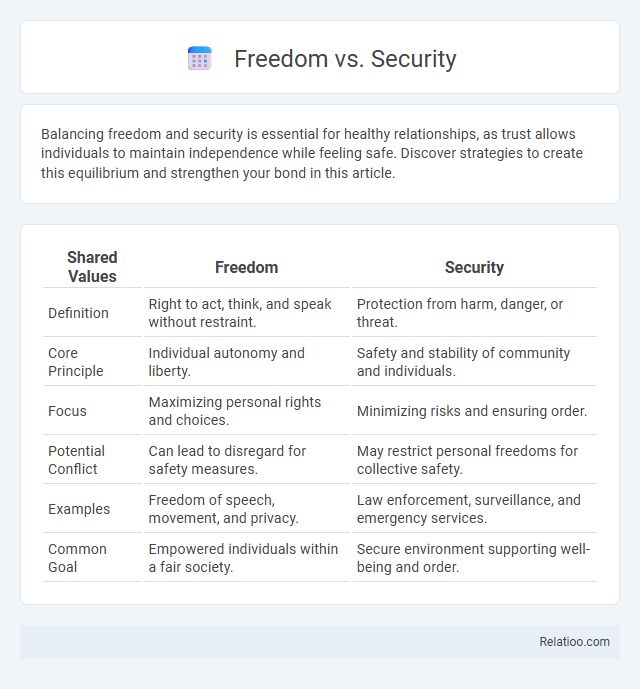Balancing freedom and security is essential for healthy relationships, as trust allows individuals to maintain independence while feeling safe. Discover strategies to create this equilibrium and strengthen your bond in this article.
Table of Comparison
| Shared Values | Freedom | Security |
|---|---|---|
| Definition | Right to act, think, and speak without restraint. | Protection from harm, danger, or threat. |
| Core Principle | Individual autonomy and liberty. | Safety and stability of community and individuals. |
| Focus | Maximizing personal rights and choices. | Minimizing risks and ensuring order. |
| Potential Conflict | Can lead to disregard for safety measures. | May restrict personal freedoms for collective safety. |
| Examples | Freedom of speech, movement, and privacy. | Law enforcement, surveillance, and emergency services. |
| Common Goal | Empowered individuals within a fair society. | Secure environment supporting well-being and order. |
Understanding the Balance: What Is Freedom vs Security?
Freedom and security represent core values often in tension, where freedom emphasizes individual rights and autonomy, while security prioritizes protection and safety from harm or threats. Understanding the balance requires recognizing that too much security can lead to restrictions on personal freedoms, whereas excessive freedom without safeguards can result in disorder or danger. You must evaluate your priorities to find a balance that respects personal principles while ensuring a secure environment.
Historical Perspectives on Freedom and Security
The historical debate between freedom and security is exemplified by the tension during the Cold War, where governments imposed strict surveillance and restrictions to counter perceived threats, often at the expense of civil liberties. The American Bill of Rights enshrined individual freedoms, yet wartime measures like the Alien and Sedition Acts revealed how security concerns can override principles during crises. Philosophers such as John Locke emphasized natural rights, laying the foundation for balancing personal freedom with collective security throughout history.
Political Philosophies: Individual Liberty or Collective Safety?
Political philosophies often debate the balance between individual liberty and collective safety, emphasizing freedom as a fundamental right versus security as a necessary condition for social order. Libertarianism prioritizes personal autonomy and minimal government interference, arguing that freedom enables innovation and moral agency. Conversely, communitarianism and social contract theories stress the importance of collective safety, asserting that shared principles and regulations protect citizens and maintain societal stability.
Societal Impact: How Security Measures Affect Personal Freedoms
Security measures often limit your personal freedoms by imposing surveillance, restrictions, and controls intended to protect society from threats. These limitations can create a trade-off where increased safety comes at the cost of reduced individual autonomy and privacy. Societal impact manifests as ongoing debates about balancing national security interests with the preservation of civil liberties and human rights.
Technology’s Role in the Freedom-Security Debate
Technology plays a critical role in balancing freedom and security by enabling advanced surveillance systems that enhance public safety while raising concerns about privacy infringement. Encryption technologies protect individual freedoms by securing personal data from unauthorized access, yet governments often advocate for backdoors to combat threats, sparking debates on ethical boundaries. The principle of safeguarding human rights challenges technologists and policymakers to design frameworks that ensure security measures do not erode fundamental freedoms in digital spaces.
Government Surveillance: Protection or Invasion of Privacy?
Government surveillance raises critical questions about balancing national security and individual freedoms, often challenging Your right to privacy. While surveillance aims to protect against threats and ensure public safety, it can also lead to invasive monitoring that undermines civil liberties and personal autonomy. Analyzing the ethical implications of surveillance programs reveals a complex tension between maintaining security and upholding fundamental democratic principles.
Freedom vs Security in Times of Crisis
In times of crisis, balancing freedom and security becomes a critical challenge, as measures to ensure national safety often limit individual liberties such as privacy, free movement, and expression. Historical examples highlight how governments implement emergency laws, surveillance, and restrictions to mitigate threats, but excessive control risks eroding democratic principles and public trust. Effective crisis management demands transparent policies that safeguard security while preserving fundamental freedoms, promoting a resilient society that respects constitutional rights even under duress.
Legal Frameworks: Rights, Restrictions, and Responsibilities
Legal frameworks balance freedom, security, and principle by delineating rights, restrictions, and responsibilities that protect individuals while maintaining societal order. Constitutional rights guarantee freedoms such as speech and privacy, yet laws impose restrictions to prevent harm and ensure public safety. Responsibilities under these frameworks require citizens to respect others' rights and adhere to regulations that uphold justice, reflecting a principled approach to governance.
Public Opinion: How Do People Prioritize Freedom and Security?
Public opinion on freedom versus security reveals diverse priorities, with many individuals balancing civil liberties against safety concerns depending on current threats. Surveys consistently show that during times of crisis, such as terrorism or pandemics, a significant portion of the population favors enhanced security measures even if it means curbing some freedoms. Your perspective on this trade-off often reflects personal values, trust in government, and perceived risks within society.
Finding Common Ground: Striking the Right Balance
Balancing freedom, security, and principle requires carefully weighing individual rights against collective safety to find a sustainable middle ground. Effective policies integrate robust security measures while preserving fundamental freedoms and adhering to core ethical principles, ensuring neither is sacrificed. Open dialogue and transparent governance foster trust, enabling societies to navigate complexities without compromising justice or liberty.

Infographic: Freedom vs Security
 relatioo.com
relatioo.com